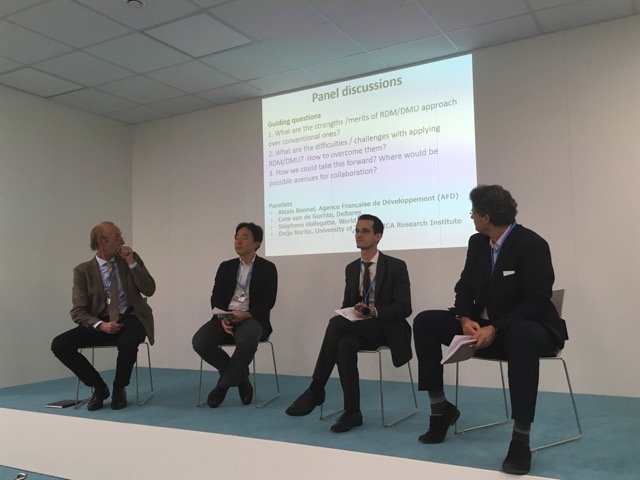
10:30 - 12:00
| Event title | Making robust investment decisions under deep uncertainty: a new approach to sustainable development planning in uncertain world |
|---|---|
| Contents | Traditionally, development planning and investment decisions have heavily counted on our ability to accurately forecast future state of economy and environment, in a belief that there should be “optimal” options under the forecast conditions. However, the recent trend of trying to adapt development planning to climate change has led to a growing recognition that this is a formidable task. We face deep uncertainty under changing climate and fast-changing world. This session sheds light on a new school of thoughts and practices for sustainable development planning under deep uncertainty. It will begin with a brief introduction to the concept of Decision Making under Uncertainty (DMU), followed by presentations on case studies of applying the new approach to investment decisions for climate resilient infrastructure. An additional presentation and panel discussion will explore the potential application of the Decision Making under Deep Uncertainty concept to a broader set of issues involving uncertainty and complexity, such as long-term development planning for low-emission, climate resilient and sustainable futures, crisis management or conflict resolution. |
| Keywords | Decision making under uncertainty, Adaptation, Resilient infrastructure |
| Presenters / panelists |
|
| Moderator |
|
| Organiser / Co-organiser |
|
Opening and introduction (5 min)
Presentation 1 (15 min):
Decision-making under deep uncertainty
Presentation 2 (15 min):
Making Robust Investment Decisions Under Deep Uncertainty: Case Study of the Mwea Irrigation Development Project, Kenya
Presentation 3 (15 min):
Decision Making under Uncertainty: New Approaches for Designing Sustainable Development
Q&A (10 min):
Panel Discussions (25 min):
Closing (5 min):
Decisions we make today may have long-term consequences. the traditional approach to development planning tries to predict the future accurately and identify optimal options based on this prediction. However, future climate uncertainty and other uncertain socio-economic factors make the task very difficult. A new approach called Decision Making under Deep Uncertainty (DMDU) provides innovative ways to address this challenge.
The DMDU approach starts from identifying available strategies and options, and put them on stress-testing under a (sometimes large) number of possible future scenarios, which helps us to find and/or generate a discussion about the most robust or least vulnerable ones. The work of Deltares demonstrated that this approach could also integrate the Dynamic Adaptive Policy Pathways method that helps us to make decisions over time and craft sequences of decisions (pathways) under uncertainty.
The case study undertaken by the World Bank applied this approach to the urban development project in Metro Colombo, which illustrated wetland conservation can significantly reduce the risk of future regret from losing wetland ecosystem services. The case study undertaken by JICA on an irrigation project in Kenya showed the power of this approach to reveal robust options against an uncertain future.
The application of the DMDU approach is not limited to adaptation projects. AFD endeavors to use this approach to facilitate a paradigm shift from conventional deterministic – and potentially reductionist - approaches to sustainable development planning, and be better prepared and proactive to address future uncertainty.
Criticism of the DMDU approach often includes; it is too complicated, and there is no sufficient data to conduct such analyses. Also, because climate impacts arrive in the future, it is difficult to demonstrate the effectiveness of the strategies and options identified by this approach. Raising awareness and understanding among development practitioners and stakeholders of partner countries about the necessity, effectiveness and practicality of the DMDU approach, compared to the traditional “predict then act approach”, can help overcome such criticism. DMDU is scalable from national to local levels, includes collaborative modeling and narratives, and does not need to rely solely on data intensive modeling, as it also promotes change of mindset in the design of decisions.
Participants converged on the view that it is necessary to raise awareness and understanding of the DMDU approach among a broad range of stakeholders. One way to facilitate this is to apply the approach to concrete programs and showcase its benefits. Another way is to encourage interested stakeholders to join the Society of DMDU where academics and practitioners join forces to further develop methodologies and push this agenda forward. Yet another way is to involve more financial institutions in the discussions of this subject at or in the margin of various milestone events, e.g. Climate COPs, IDFC Climate Finance Fora and Climate Summits.
Ichiro Sato, Office for Climate Change, Japan International Cooperation Agency (JICA)


Copyright Ministry of the Environment Government of Japan. All rights reserved